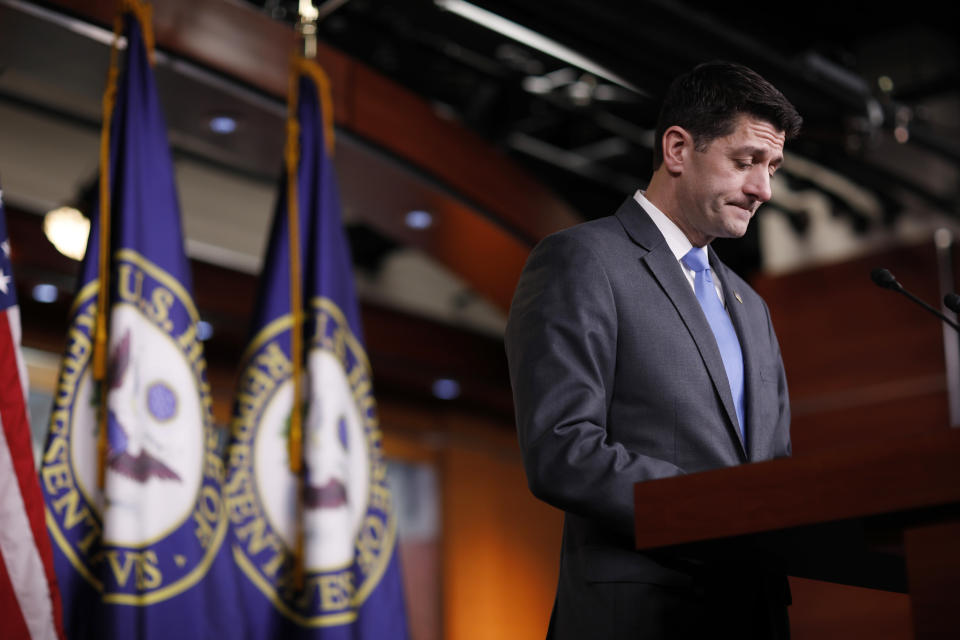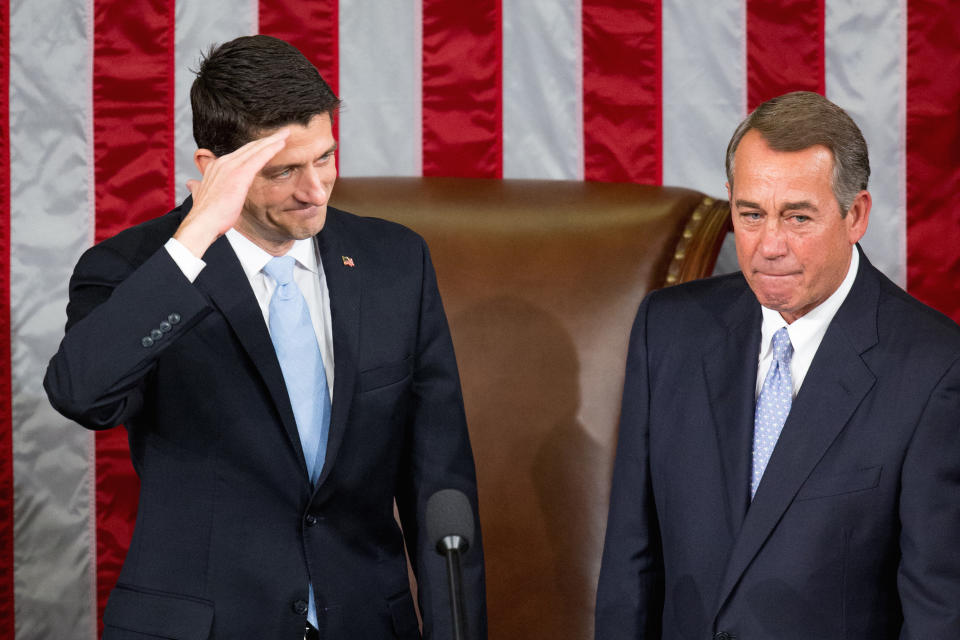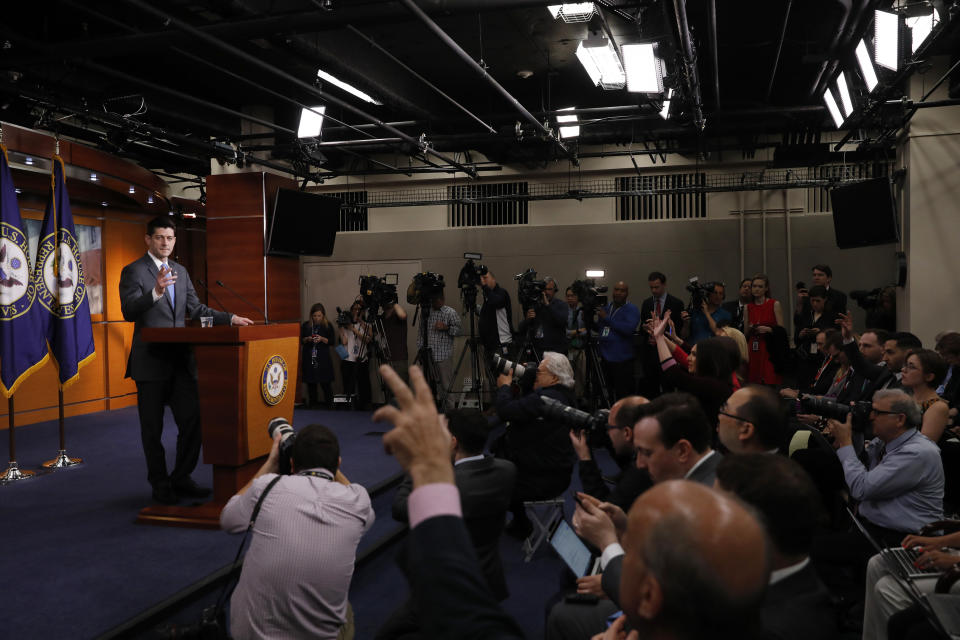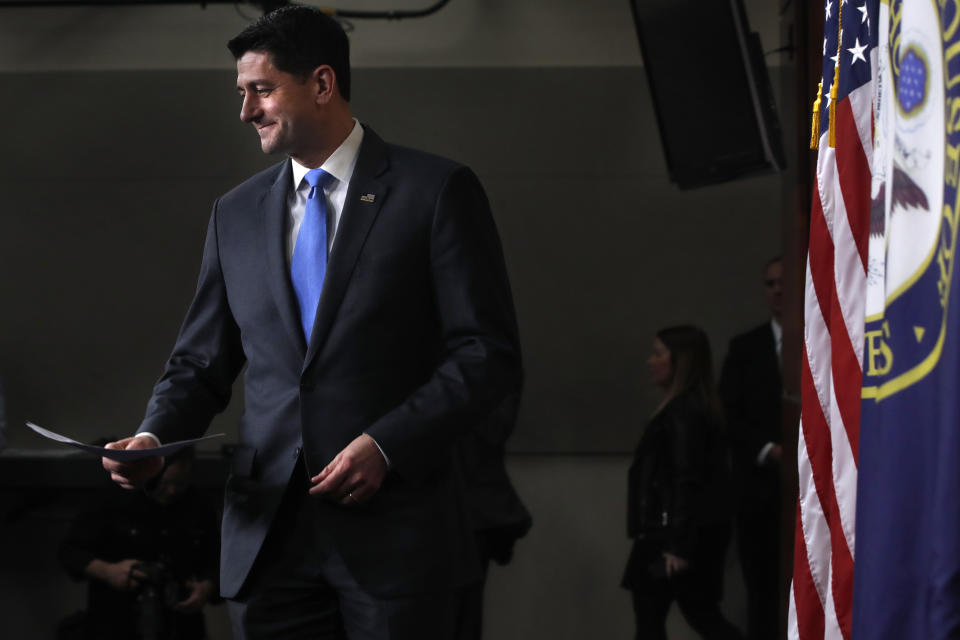Paul Ryan, lame duck: What does the future hold for him?
House Speaker Paul Ryan shocked Washington by announcing Wednesday that he will not seek reelection, saying he wanted to spend more time with his children. The Wisconsin Republican expressed pride in his party’s accomplishments, which includes delivering on tax-cut promises, and told reporters that House Republicans, considered in danger of losing their majority in November, could run on that record.
The 115th United States Congress formed on Jan. 3, 2017, during the final weeks of Barack Obama’s presidency, and will conclude on Jan. 3, 2019, after two years of Donald Trump in office. Ryan is expected to remain speaker for the remainder of the year, an unusually long lame-duck period for a retiring speaker. Yahoo News contacted political scientists and governance experts to see what such an early announcement means for his remaining time and the GOP’s future.
Nolan McCarty, chair of the department of politics and a professor at Princeton University’s Woodrow Wilson School of Public and International Affairs, said there aren’t any recent examples for comparison. He pointed out that John Boehner’s three-week period between announcing his resignation and stepping down was the longest in recent memory.
“The others who resigned were replaced very quickly. You really have to go back to the 1920s, when there was a period in which a speaker was a lame duck for any period of time,” McCarty said. “Before we changed the Constitution, there would be these long lame-duck sessions of Congress between the November elections and the March inaugurations.” The 20th Amendment, ratified in 1933, moved the start of congressional terms from March 4 to Jan. 3.

The unusual nature of lame-duck sessions is why McCarty suspects there may be some pressure on Ryan to resign and allow for a quicker replacement. On the other hand, he said, it took three weeks to replace Boehner because of infighting among the Republican Party’s many factions. The person the party settled on was Ryan.
“I suspect that might still be true, so they might have a difficult time trying to figure out who will replace Ryan. In the meantime, I think he will just hold the office and not accomplish very much,” he said.
Sarah Binder, professor of political science at George Washington University, agreed that Ryan’s exit is unusual for modern American politics. Others speakers have stepped down abruptly amid scandals (Jim Wright-, Newt Gingrich, Bob Livingston) or when their party has lost control (Dennis Hastert, John Boehner). Therefore, she said, history doesn’t provide us with a great roadmap for what to expect going forward.
One possible path for Ryan, Binder said, is continuing to fight for Republican control of the House, which would include fundraising and trying to persuade his fellow Republicans from retiring. But she said there are questions about how effective he can be at that since “he’s just waved the white flag and jumped ship, even though he’s postponed the jumping of the ship.”
Another option, she said, is for Ryan to significantly distance himself from Trump.

“We do have other retiring Republicans, who once they decided to sever their connection with the voters, have been a little more willing to speak up. Is that Paul Ryan? I don’t know. It depends in part on what he sees as his future,” Binder said.
David Barker, director of the Center for Congressional and Presidential Studies and government professor at American University, also thinks Ryan will be less effective, “as lame ducks always are,” because people will rightly recognize that he will not have direct power or the ability to punish or reward members.
“He will not have people’s trust. This is especially true if he does start really speaking his mind in a way that does not reflect pure loyalty to the partisan tribe or to Trump. So, the more he gets off his chest, the less power he will have within the chamber,” Barker said.
Ryan may simply think that the GOP is going to lose the House and has no interest in being minority leader. And he is surely tired of the same thing that other retiring Republicans such as Rep. Trey Gowdy, R-S.C. are — having to defend the indefensible, Barker said.
But it could also be the byproduct of either satisfaction or frustration.
“Satisfaction that he was able to push through the biggest tax cut in history — which is the sort of thing that has really animated him — or frustration over what is happening on the spending side on his watch. He might be ready to give up, or at least not want to shoulder any more blame for what will happen to the debt.”

Nevertheless, Barker said, Ryan may decide to start speaking freely, depending on his next steps. Straying from the party line may salvage his reputation more broadly, possibly historically. Barker said this could set himself up for a better book deal, a better media deal or a place within the party after the Trump era.
Matt Dallek, a historian at George Washington University’s Graduate School of Political Management, said the major downside to Ryan’s announcement is that from the Republican perspective he has essentially “neutered himself.” Despite claims that he will continue to raise money and defend Republican seats, Ryan’s announcement could result in a decline in GOP morale and bolster the popular narrative that they are barely holding on and will likely lose their majority in November.
“If you have a leader who is able to maintain the fire under his or her troops and say, ‘It’s a bad environment but we have all these assets, you can maintain morale. But if he’s gone, it’s very hard for him to be the voice that inspires Republicans,” Dallek said.
“It’s significant in all these sorts of ways, and makes it harder for Republicans to run, not just on what they have achieved, but what they are going to do. What would they do in the next Congress, given they have this leadership vacuum? It’s unclear what their agenda would be.”
Mark Harkins, senior fellow at the Government Affairs Institute of Georgetown University, said it’s not a surprise that Ryan announced he won’t be speaker next Congress — the only surprise is that it was today. He said this isn’t great news for the Republicans but that Ryan can rightfully say the early announcement is for the good of the party.

There are already reports that Majority Whip Steve Scalise and Majority Leader Kevin McCarthy have been quietly courting Republicans in the event that Ryan retired. Harkins said speculation about their interest in his job may have forced Ryan to act sooner.
“In an attempt to bring this out from the shadows and let everybody be above board, his announcing that he’s not going to stand for speaker next time allows Scalise and McCarthy the ability to solicit their colleagues without feeling that they’re going behind Speaker Ryan’s back. That actually helps the party a lot in making this all above board,” Harkins said.
Harkins said Ryan may also be thinking about the fate of his own congressional seat. The filing date in Wisconsin is June 1. He already has a Democratic challenger, so if he cares about keeping the seat in Republican hands he needed to announce now so other Republicans could line up to run for his seat.
Ryan’s stepping down doesn’t mean he’s out of politics altogether. He may be preparing for a gubernatorial race in his purple home state or angling for a presidential run. If the latter is true, by 2024, either Trump will be term-limited or a first-term Democratic president will be running for reelection — either way it will be an open primary for the Republicans.
“He’s 48 years old,” Harkins said. “In six years, he’s still going to be less than 60, which is almost a decade younger than the last set of presidential candidates when they were running.”
Read more from Yahoo News:


